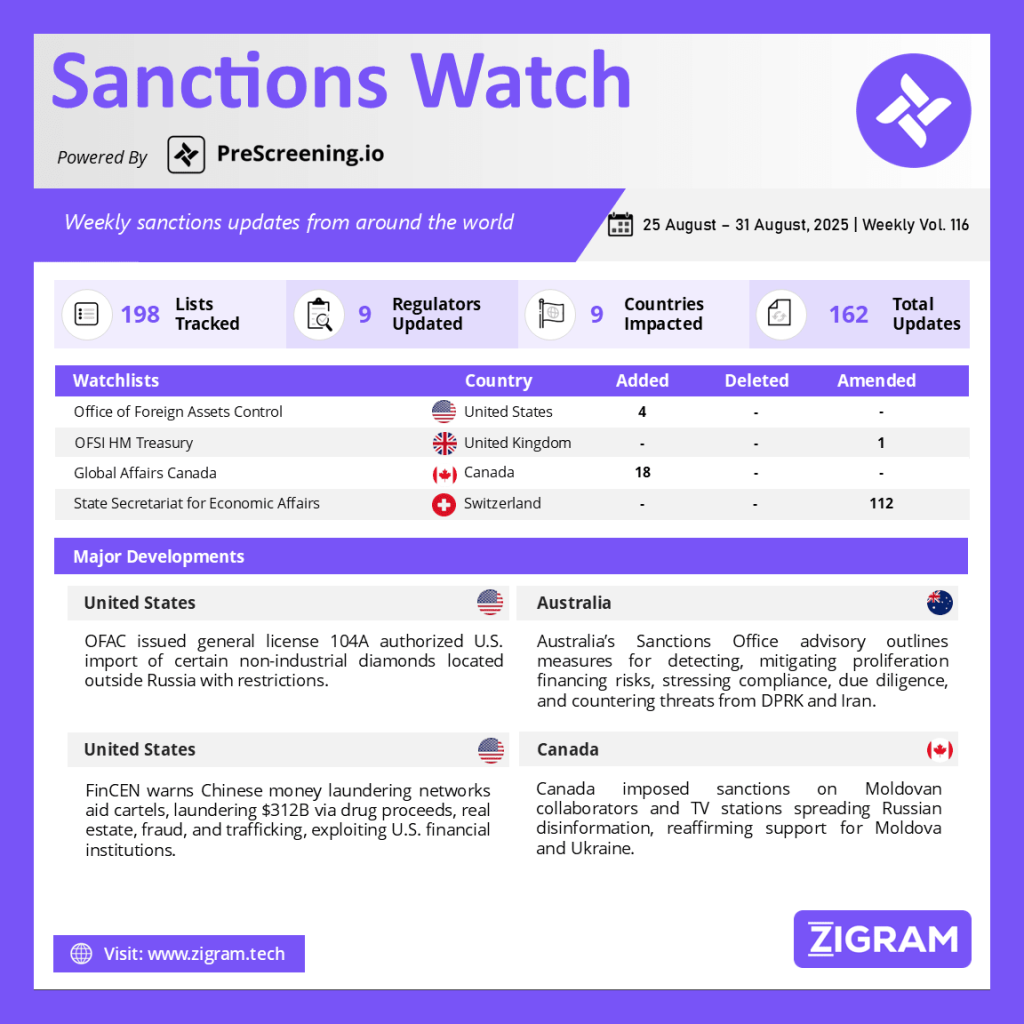Sanctions Watch Vol 116
In the latest edition of our Sanctions Watch weekly digest, we present significant updates on sanction watchlists and regulatory developments.
1. OFAC Issued Russia-Related General License 104A, Updates Sanctions to Counter DPRK Weapons Financing
The U.S. Department of the Treasury’s Office of Foreign Assets Control (OFAC) announced new measures to reinforce sanctions targeting North Korea and Russia. OFAC unveiled General License 104A, which authorizes certain transactions involving the import of specific categories of non-industrial diamonds otherwise restricted under Executive Order 14068. This license allows the importation of diamonds that were physically located outside Russia before specific cut-off dates, provided they have not been exported or re-exported from Russia since those dates. Specifically, non-industrial diamonds of 1.0 carat or greater must have been outside Russia since March 1, 2024, and diamonds of 0.5 carats or greater since September 1, 2024. The authorization remains valid until September 1, 2026. Importantly, Russian-origin non-industrial diamonds remain prohibited altogether, and the license does not override broader prohibitions under the Russian Harmful Foreign Activities Sanctions Regulations.
Alongside this, OFAC updated its Specially Designated Nationals (SDN) list, targeting a fraudulent financial network supporting North Korea’s weapons programs. These actions underscore Washington’s dual focus: tightening enforcement on illicit financial flows fueling DPRK’s military ambitions, while providing clarity for U.S. businesses on diamond trade compliance. The combined steps highlight Treasury’s commitment to curbing proliferation threats while safeguarding legitimate commerce.
2. Australia Strengthens Framework to Counter Proliferation Financing and Enhance Sanctions Compliance
The Australian Sanctions Office (ASO), under the Department of Foreign Affairs and Trade, has released a comprehensive advisory note on sanctions and proliferation financing (dated 25 August 2025). The guidance is directed at government agencies, businesses, and regulated entities operating under Australian sanctions laws. Its objective is to help organization’s identify, assess, and mitigate risks associated with the financing of weapons of mass destruction (WMD), including nuclear, chemical, biological, and radiological weapons.
The advisory underscores the importance of strong compliance frameworks, recommending robust due diligence, sanctions screening, and risk assessments. It outlines risk factors such as customer links to sanctioned countries, high-risk jurisdictions, dual-use goods, and complex financial transactions. International obligations, including UN Security Council Resolutions (1540, 2325, 2270, and 2371), along with FATF Recommendation 7, are highlighted as key standards.
Special focus is placed on DPRK and Iran, with calls for enhanced countermeasures against their proliferation financing threats. High-risk sectors identified include trust and company service providers, virtual asset service providers, maritime operators, and academic institutions vulnerable to misuse. The note also provides a list of red flags and stresses ongoing monitoring, enhanced due diligence, and AML/CTF alignment to protect Australia’s financial system and contribute to global security.
3. FinCEN Warns of Expanding Chinese Money Laundering Networks Fueling Cartel Operations and Illicit Finance
The U.S. Department of the Treasury’s Financial Crimes Enforcement Network (FinCEN) issued an Advisory and Financial Trend Analysis (FTA) warning about the scale and threat of Chinese Money Laundering Networks (CMLNs) in the United States. Drawing on more than 137,000 Bank Secrecy Act (BSA) reports filed between 2020 and 2024, FinCEN highlighted over $312 billion in suspicious transactions tied to CMLN-related activity. These networks are heavily utilized by Mexico-based drug cartels—many designated as Foreign Terrorist Organizations—to launder drug proceeds, including those from fentanyl trafficking.
CMLNs exploit currency restrictions in both Mexico and the People’s Republic of China, creating a mutually beneficial system: cartels sell illicit U.S. dollars to CMLNs, who in turn provide funds to Chinese citizens seeking to bypass China’s currency controls. Beyond narcotics, CMLNs are implicated in human trafficking, smuggling, fraud, healthcare scams, and real estate laundering schemes exceeding $53 billion. Tactics include trade-based money laundering, use of money mules, shell companies, counterfeit passports, and infiltration of financial institutions.
FinCEN emphasized key red flags—such as money mules declaring low-income occupations while moving large sums—to help institutions detect illicit activity. Treasury underscored its commitment to dismantling CMLNs alongside domestic and international partners.
The latest sanctions strengthen pressure on Moscow’s financial lifelines, signaling the UK’s determination to choke off illicit money flows sustaining Russia’s invasion of Ukraine.
4. Canada Imposed New Sanctions on Russian Collaborators in Moldova to Counter Kremlin Influence
Canada announced additional sanctions targeting Russian collaborators in Moldova under the Special Economic Measures (Moldova) Regulations. Foreign Affairs Minister Mélanie Joly confirmed that nine Moldovan individuals linked to sanctioned oligarchs Vladimir Plahotniuc and Ilan Shor are now subject to restrictive measures. Several of those sanctioned are also connected to the Shor Party, which Canada sanctioned in June 2023 for its role in promoting Russian destabilization narratives against Moldova’s democratically elected government.
In addition, Canada sanctioned six Moldovan television stations whose licenses were revoked by Moldova’s Commission for Exceptional Situations. These outlets were found to be actively spreading Russian propaganda and disinformation justifying Moscow’s invasion of Ukraine.
The move coincides with the fourth meeting of the Moldova Support Platform in Chisinau, which brings together international partners to strengthen Moldova’s resilience in the face of Russian aggression. Canada emphasized that the sanctions reinforce its unwavering support for both Moldova and Ukraine, as they defend their sovereignty, independence, and democratic institutions.
Since 2014, Canada has sanctioned over 2,700 individuals and entities complicit in undermining Ukraine’s territorial integrity. The country has also committed more than $9.5 billion in financial, military, and humanitarian aid to Ukraine since January 2022.
Know more about the product: PreScreening.io
Click here to book a free demo.
Sanctions Watch is a weekly recap of events and news related to sanctions around the world.
- #OFAC
- #Sanctions
- #Diamonds
- #AustraliaSanctions
- #ProliferationFinancing
- #FinCEN
- #MoneyLaundering
- #Cartels
- #CanadaSanctions
- #Moldova

